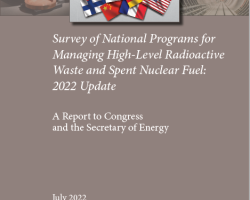Category of Content
Siting Experience Documents Only
Publication Date
Subject Matter
Characterization of Weld Regions on a Full-Scale Cylindrical Mockup of an Interim Storage Container
Characterization of Weld Regions on a Full-Scale Cylindrical Mockup of an Interim Storage Container
Data Report on Corrosion Testing of Stainless Steel SNF Storage Canisters
Data Report on Corrosion Testing of Stainless Steel SNF Storage Canisters
Uncertainty quantification methodologies development for storage and trans- portation of used nuclear fuel: Pilot study on stress corrosion cracking of canister welds
Uncertainty quantification methodologies development for storage and trans- portation of used nuclear fuel: Pilot study on stress corrosion cracking of canister welds
Preliminary Report: Effects of Irradiation and Thermal Exposure on Elastomeric Seals for Cask Transportation and Storage
Preliminary Report: Effects of Irradiation and Thermal Exposure on Elastomeric Seals for Cask Transportation and Storage
FY20 STATUS REPORT- SNF INTERIM STORAGE CANISTER CORROSION AND SURFACE ENVIRONMENT INVESTIGATIONS
FY20 STATUS REPORT- SNF INTERIM STORAGE CANISTER CORROSION AND SURFACE ENVIRONMENT INVESTIGATIONS
Sensitivity of Spent Fuel Temperatures to Variable Canister Backfills
Sensitivity of Spent Fuel Temperatures to Variable Canister Backfills
Analysis of Dust Samples Collected from an In-Service Interim Storage System at the Maine Yankee Nuclear Site
Analysis of Dust Samples Collected from an In-Service Interim Storage System at the Maine Yankee Nuclear Site
Status Update on the Canister Deposition Field Demonstration
Status Update on the Canister Deposition Field Demonstration
Uncertainty quantification methodologies development for stress corrosion cracking of canister welds
Uncertainty quantification methodologies development for stress corrosion cracking of canister welds
Technical Work Plan: Environmental Degradation of Materials Relevant to Interim Storage and Permanent Disposal of Used Nuclear Fuel
Technical Work Plan: Environmental Degradation of Materials Relevant to Interim Storage and Permanent Disposal of Used Nuclear Fuel
Preliminary Test Design and Plan for a Canister Deposition Field Demonstration
Preliminary Test Design and Plan for a Canister Deposition Field Demonstration
SNF Interim Storage Canister Corrosion and Surface Environment Investigations
SNF Interim Storage Canister Corrosion and Surface Environment Investigations
Materials for Consideration in Standardized Canister Design Activities??
Materials for Consideration in Standardized Canister Design Activities??
M3SF-21PN020401053- COBRA-SFS Version 6.1 User Guide- A Thermal Hydraulic Analysis Code for Spent Fuel Storage and Transpor
M3SF-21PN020401053- COBRA-SFS Version 6.1 User Guide- A Thermal Hydraulic Analysis Code for Spent Fuel Storage and Transpor
Guidance for Creating a Community Benefits Plan for Regional Direct Air Capture Hubs
Guidance for Creating a Community Benefits Plan for Regional Direct Air Capture Hubs
This document is intended to provide supplemental information to assist applicants developing a Community Benefits Plan (CBP) for the Regional Direct Air Capture Hubs. As shown in the graphic to the right, Community Benefits Plans are based on a set of four core interdependent policy priorities: engaging communities and labor; investing in America's workforce; advancing diversity, equity, inclusion, and accessibility; and implementing Justice40.
Policies for Achieving Energy Justice in Society: Best Practices for Applying Solar Energy Technologies to Low-Income Housing
Policies for Achieving Energy Justice in Society: Best Practices for Applying Solar Energy Technologies to Low-Income Housing
Studies indicate that the energy burden — energy costs as a percentage of annual family income — on low-income families is inordinately high, compared to that of the rest of the population. Rising fuel costs exacerbate this problem. Residential solar energy systems can help address this situation by furnishing a price-stable energy source with the added benefit of reduced greenhouse gas emissions. However, without appropriate incentives, these systems are prohibitively expensive for low-income families.
Survey of National Programs for Managing High-Level Radioactive Waste and Spent Nuclear Fuel: 2022 Update
Survey of National Programs for Managing High-Level Radioactive Waste and Spent Nuclear Fuel: 2022 Update
In October 2009, the U.S. Nuclear Waste Technical Review Board (Board or NWTRB) published Survey of National Programs for Managing High-Level Radioactive Waste and Spent Nuclear Fuel. For each of the 13 national programs studied, the report catalogued 15 institutional arrangements that had been set in place and 15 technical approaches that had been taken to design repository systems for the long-term management of high-activity radioactive waste.

